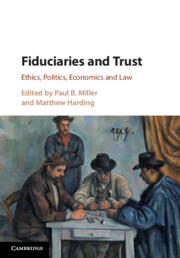Book contents
- Fiduciaries and Trust
- Fiduciaries and Trust
- Copyright page
- Dedication
- Contents
- Contributors
- Acknowledgements
- Introduction
- Part I Personal Trust and Fiduciary Relationships
- 1 Fiduciary Grounds and Reasons
- 2 Trust and Advice
- 3 Contracts, Fiduciary Relationships and Trust
- 4 Trust, Autonomy and the Fiduciary Relationship
- 5 The Psychology of Trust and Fiduciary Obligations
- Part II Personal Trust and Fiduciary Duties
- Part III Political Trust and Fiduciary Government
- Part IV Trust and Fiduciary Law in Context
- Index
4 - Trust, Autonomy and the Fiduciary Relationship
from Part I - Personal Trust and Fiduciary Relationships
Published online by Cambridge University Press: 13 March 2020
- Fiduciaries and Trust
- Fiduciaries and Trust
- Copyright page
- Dedication
- Contents
- Contributors
- Acknowledgements
- Introduction
- Part I Personal Trust and Fiduciary Relationships
- 1 Fiduciary Grounds and Reasons
- 2 Trust and Advice
- 3 Contracts, Fiduciary Relationships and Trust
- 4 Trust, Autonomy and the Fiduciary Relationship
- 5 The Psychology of Trust and Fiduciary Obligations
- Part II Personal Trust and Fiduciary Duties
- Part III Political Trust and Fiduciary Government
- Part IV Trust and Fiduciary Law in Context
- Index
Summary
Some accounts of the fiduciary relationship place trust and autonomy at odds with one another, so that trusting a fiduciary to act on one’s behalf reduces one’s ability to be autonomous. In this chapter, we critique this view of the fiduciary relationship (particularly bilateral instances of this relationship) using contemporary work on autonomy and ‘relational autonomy’. Theories of relational autonomy emphasize the role that interpersonal trust and social relationships play in supporting or hampering one’s ability to act autonomously. We argue that fiduciary relationships, understood through the lens of relational autonomy, can provide a means of enhancing, rather than diminishing, beneficiaries’ autonomy.
Keywords
- Type
- Chapter
- Information
- Fiduciaries and TrustEthics, Politics, Economics and Law, pp. 74 - 86Publisher: Cambridge University PressPrint publication year: 2020
- 7
- Cited by

